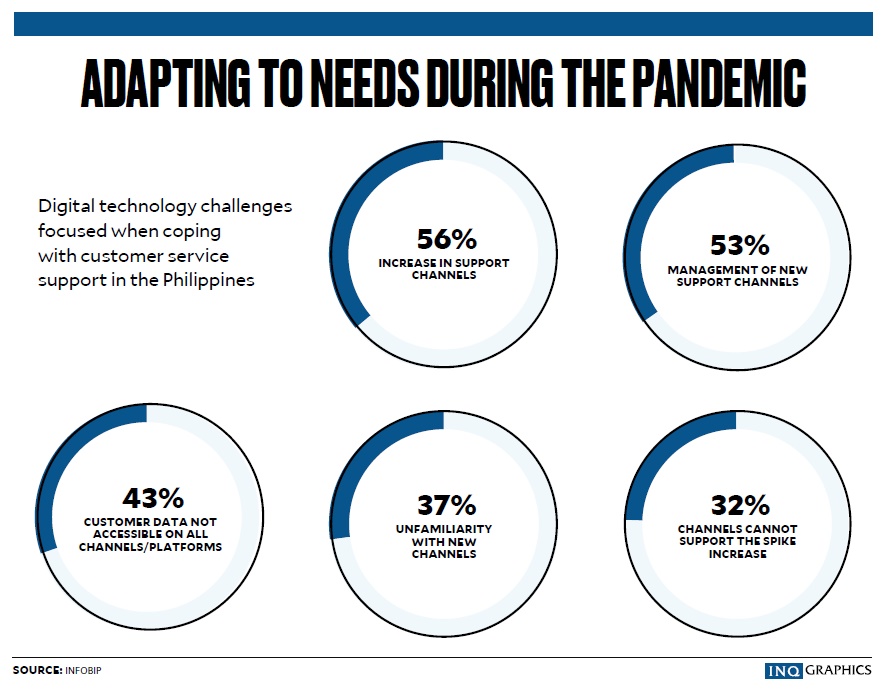Leveling up customer experience for the digital era
The major shift to remote work in 2020 signalled the beginning of a critical digital transformation journey for many businesses in the Asia Pacific (APAC) region. Among the many disruptions was the enormous pressure on businesses to continue delivering great customer experience (CX), no matter the circumstances.
The Asian Development Bank (ADB) noted that business-to-consumer revenues of digital platforms reached $3.8 trillion in 2019 globally, with APAC accounting for about 48 percent. This percentage is expected to have increased in 2020, with more business transactions migrating to the digital space due to COVID-19.
Moreover, in its recent Asia Economic Integration Report 2021, the ADB cited how digital and technology-based tools are providing new growth opportunities for businesses of varying sizes and across all industries to help them recover.
To aid in this aspect, Infobip, with its recent study – titled “A Year of Disruption: Managing Increasing Complexities in Customer Service” – looked at the impact that COVID-19 had on companies’ existing customer support teams, the necessity to shift to remote working, and the fundamental role that digital technologies for customer service support had taken on.
The research surveyed 2,760 professionals across Singapore, Malaysia, Indonesia, Taiwan, South Korea, China, Thailand, Vietnam, and the Philippines.
Article continues after this advertisementOn a scale of 1 to 10, respondents rated an eight on average, the necessity to digitalize customer support systems. Half of those surveyed also shared how this would be a permanent implementation moving forward, considering the lasting benefits that come with automation and a digital omnichannel hub to provide better CX.
Article continues after this advertisementBetween developing and deploying business continuity plans that accelerate their digital transformation, here are some points on how companies can focus on keeping customers happy and satisfied during this unprecedented time.
Adapting to real-time customer needs
As businesses adjust to the new-norm, they will need to invest in different solutions that help them adapt towards the needs of their markets.
Among the top challenges in relation to digital technologies when coping with customer service support in 2020 were the increase in support channels (56 percent), management of new support channels (46 percent), and unfamiliarity with new channels (34 percent). In the Philippines, more than half of the respondents cited increase in support channels (56 percent) and management of new support channels (53 percent) as the top two challenges.
Customers today are finding it more convenient to turn to social media rather than make a call or send an email for enquiries. In going digital, it also indicates that customers expect real-time responses to their problems. As is, many companies recognize this shift in consumer behavior and are improving their communication channels.
From Facebook Messenger, to WhatsApp Business, or Viber, online chat is a growing space for business-to-customer and business-to-business communications. As such, it is imperative for organizations to know their audience well and be agile enough to adapt and respond with the customers’ preferred method of communication.
Workforce re-skilling
LinkedIn, in its latest Workplace Learning Report, found that learning had become essential for organizations to thrive and innovate in this new world of remote working. C-suite executives were challenged in 2020 to quickly pivot their learning programs so these can help employees adapt to the changes, with upskilling and reskilling (59 percent) as their main focus this year.
This is similar to the findings of the Infobip research that found employee training as the top consideration for 60 percent of respondents when it comes to adopting a digital customer support system. Interestingly, respondents in the Philippines reported the highest amount of concern regarding job loss (21 percent). This is almost twice the region’s average of 12 percent.
On one hand, this could be due to how the pandemic affected many businesses and they were simply trying to stay afloat. Alternatively, it could also be attributed to employees’ lack of skills and knowledge to manage automated systems.
Since employees had to work from home (WFH) due to COVID-19, there was a dire need to digitize some CX processes. In general, most countries that the Infobip report surveyed were ready and prepared for customer support teams to transition onto a WFH setup.
Although employers may think they are ready with the relevant digital infrastructure from the outset, employees will still face difficulties if they are not adequately trained to satisfy customer needs and demands.
Hence, it is important for companies to prepare their workforce and equip them with the right digital skills. This will help assure personnel that automation will only increase their job efficiency and open up more communication channels that require their unique skill-sets.
Securing customer data
Even before the pandemic, it had been increasingly vital for businesses to extend their physical customer support services to online and social channels. However, with digitalization comes concerns with data security.
In the Philippines, the National Bureau of Investigation noted a doubling of cybercrime cases during the height of the pandemic. In this age where data is the new commodity, certain customer services require authentication and inputting of personal information before support teams can take over.
The Infobip study found that 20 percent of customers will not complete a purchase process if they feel it is not safe to share personal data. They may also reject automated customer service processes and demand to speak with a human counterpart instead.
It is only with the use of reassuring safety protocols that companies can increase the usage and efficiency of automated processes in addressing these new concerns, while managing ongoing customer complaints.
The convergence of business and information technology strategies is an important investment that business leaders must take into consideration. After all, accelerating the transformation of services across public and private sectors will help deliver more efficient, effective and extensive products and services that can help the region, especially the Philippines, in its journey towards economic recovery.
(The author is Country Manager of Infobip Philippines. It is part of Infobip, a global leader in cloud communications)

